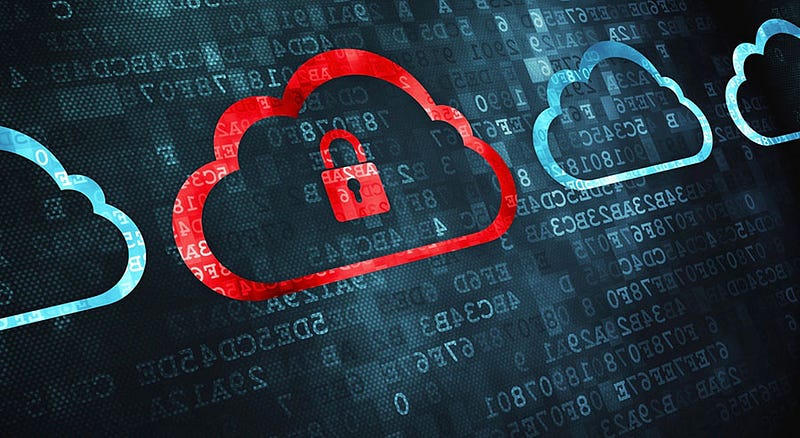Why is Security Important in Cloud Computing?
To prepare for future success, businesses need to switch from on-premise hardware to the cloud to meet their computing needs. The cloud gives enterprises access to more applications while improving data accessibility to help teams collaborate better and provide easier content management.
As organisations move toward their digital transformation strategy, they need to implement cloud security and integrate cloud-based tools and services into their infrastructure. Cloud security, also called cloud computing security, is a collection of procedures and technology that has been designed to tackle external as well as internal threats to business security.
Digital transformation and cloud migration mean different things to different organisations, but both are driven by the same idea: a need for change. As enterprises get used to these concepts and head towards optimising their operational approach, many new challenges arise when they try to balance productivity levels and security. While new technologies enable organisations to advance their capabilities outside of on-premise infrastructure, transitioning to cloud-based environments can have severe adverse impacts if it is not done securely.
Finding the right balance requires knowledge of how modern-day businesses can benefit from the use of cloud technologies while implementing the best cloud security practices.

Why is Cloud Security Important?
As most organisations are using cloud computing in one form or another these days, cloud computing security is critical to protect them. Gartner had predicted that the worldwide market for public cloud services would have grown by 23.1% in 2021 due to the high rate of adoption of public cloud services.
While companies continue to migrate to the cloud, it is essential to understand the security requirements for data to remain safe. The responsibility of data asset security and accountability does not lie with third-party cloud computing providers who manage the infrastructure. Most cloud providers follow best security practices while proactively protecting the integrity of their servers. Yet, businesses need to make their own considerations when protecting data, applications, and workloads running on the cloud.
As the digital world continues to evolve, security threats keep getting more advanced. Many of these threats target cloud computing providers because of an organisation’s lack of visibility in data access and movement. If organisations fail to take steps to improve their cloud computing security, they can face substantial governance and compliance risks while managing client information, irrespective of where it is stored.
Regardless of the size of your business, cloud security is an important discussion that you need to have. Cloud infrastructure supports almost all facets of modern computing in all industries across multiple fields. Successful cloud adoption depends on putting satisfactory countermeasures in place to defend against cyberattacks. Irrespective of the type of cloud your company operates in, cloud security solutions and best practices are necessary to ensure business success and continuity.
What is Meant by Cloud Security?
Cloud computing security, or cloud security, is a set of policies, controls, procedures, and technologies that work in tandem to ensure the security of cloud-based systems, infrastructure, and data. These measures are designed to protect cloud data, support regulatory compliance and protect the privacy of customers. It also ensures user and device authentication, data and resource access control, and data privacy protection. Cloud computing security can protect a company’s data from distributed denial of service attacks, as well as malware, hackers, and unauthorised user access.
Cloud security can be configured to meet the exact needs of the business. As these rules can be configured and managed in one place, administration overhead is reduced and IT teams can focus on other areas of business. The way cloud security is delivered depends on the individual cloud provider or the cloud security solutions in place. Implementation of cloud security processes is a joint responsibility, however, and should be taken care of by the business owner as well as the solution provider.
What Are the Four Areas of Cloud Security?
- Identity and Access Management (IAM) : IAM tools and services enable enterprises to implement policy-driven enforcement protocols for any user attempting to access on-premises as well as cloud-based services. The core functionality is creating digital identities for all users in order to actively monitor them and restrict them when necessary during all data interactions.
- Data Loss Prevention (DLP): DLP services provide a set of tools and services that have been designed to guarantee the security of regulated cloud data. These solutions make use of a combination of remediation alerts, data encryption, and other such preventative measures to protect data, whether it is at rest or in transit.
- Security Information and Event Management (SIEM): SIEM offers an exhaustive security coordinating solution that can automate threat monitoring, detection, and response in cloud-based environments. Using AI-driven technologies, it can correlate log data across many platforms and digital assets giving IT teams the ability to apply network security protocols successfully and be able to react to any potential threats quickly.
- Business Continuity and Disaster Recovery: Data breaches and disruptive outages can still occur in spite of the preventative measures that organisations may have implemented for their on-premise and cloud-based infrastructures. Businesses need to be able to react quickly to new-found vulnerabilities or system outages as soon as possible. Disaster recovery solutions are necessary and common in cloud security and can give organisations the tools, services, and protocols that are necessary to accelerate the recovery of lost data and resume normal business operations.
Cloud Security Risks
Cloud computing security risks usually fall into one of the following categories:
- An unauthorised user who is not a part of the organisation has access to internal data
- Malicious attacks such as a DDoS attack or a malware infection, that cripple or destroy cloud infrastructure
- Data is leaked or exposed
- An authorised internal user has more access to data than needed
The aim of cloud security is to decrease the danger posed by these risks as much as possible. This is achieved by protecting data through encryption and other means, managing user authentication and access and remaining operational in the event of an attack.
How Does SECUREU Provide Cloud Security?
Cloud security is a concern for many businesses, which is why we at SECUREU aim to provide comprehensive cloud computing security solutions. Our experts analyse your cloud infrastructure and scan them to find security loopholes. Once vulnerabilities have been found, we monitor the system for other security events that may occur during the assessment.
We ensure that all the IAM are set properly and no misconfigurations are present in the settings as well as in the cloud infrastructure. To make sure that your cloud infrastructure is as safe as possible, we check the requests coming to the cloud and ensure that it is not publicly accessible. Our team ensures that the sensitive data in your cloud cannot be leaked and that your business can operate without any hitches.

